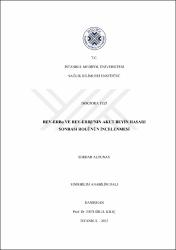| dc.contributor.author | Altunay, Serdar | |
| dc.date.accessioned | 2023-10-12T06:46:19Z | |
| dc.date.available | 2023-10-12T06:46:19Z | |
| dc.date.issued | 2022 | en_US |
| dc.date.submitted | 2022-12-27 | |
| dc.identifier.citation | Altunay, S. (2022). REV-ERBa ve REV-ERBβ'nın akut beyin hasarı sonrası rolünün incelenmesi. (Yayımlanmamış doktora tezi). İstanbul Medipol Üniversitesi Sağlık Bilimleri Enstitüsü, İstanbul. | en_US |
| dc.identifier.uri | https://tez.yok.gov.tr/UlusalTezMerkezi/tezSorguSonucYeni.jsp | |
| dc.identifier.uri | https://hdl.handle.net/20.500.12511/11567 | |
| dc.description.abstract | Dünyada ölüm nedenleri bakımından ikinci sırada yer alan inmenin insidansı sirkadiyen bir dağılım göstermektedir. Tüm fizyolojik durumlarımızı düzenleyen sirkadiyen ritmin hem inmenin tetiklenmesine hem de inme sonrasında gelişen patofizyolojik süreçlere önemli etkileri bulunmaktadır. Son yıllarda yapılan çalışmalar sirkadiyen ritmin düzenlemesinde ve devam ettirilmesinde görevli olduğu bilinen nükleer reseptörler RevErbα ve RevErbβ'nın (RevErbα/β) patofizyolojik süreçlerde önemli rollerinin olabileceğini göstermektedir. Bu tez kapsamında nükleer reseptörler olan RevErbα/β'nın (lentivirüs aracılığı ile) protein ifadelerinin artırılmasının veya baskılanmasının fare akut iskemi modelindeki etkileri araştırılmıştır. Beyin hasarı sonrası elde edilen beyin dokularından enfarktüs hacmi, beyin ödemi ve kan beyin bariyeri geçirgenliği araştırılmıştır. Ayrıca geniş ölçekli sıvı kromatografisi/kütle spektrometresi aracılı proteomik analizlerle RevErbα/β'nın etkilediği protein profili gösterilmiştir. Protein ifadesi artırılan grupta hasar hacmi, ödem hacmi ve kan beyin bariyeri geçirgenliğinin azaldığı görülmüştür. Tersine, protein ifadesi baskılanan grupta ise, hasar hacmi, ödem hacmi ve kan beyin bariyeri geçirgenliğinin arttığı gözlemlenmiştir. Yapılan proteom analizinde RevErbα/β protein ifadesi artırılan gruplarda 291, baskılanan gruplarda ise 50 farklı proteinin anlatımının istatistiksel olarak anlamlı ölçüde değiştiği gösterilmiştir. Elde edilen sonuçlar, RevErbα/β protein ifadelerinin artırılması veya baskılanmasının iskemik inmenin patofizyolojisi üzerine farklı etkileri olduğunu göstermektedir. Bu tez, TÜBİTAK tarafından 1001 proje kapsamında 219S913 nolu proje tarafından desteklenmiştir. | en_US |
| dc.description.abstract | The incidence of stroke, which ranks second in the world in terms of causes of death, shows a circadian distribution. The circadian rhythm, that regulates all our physiological states, has important effects on both the triggering of stroke and the pathophysiological processes that develop after stroke. Recent studies have shown that the nuclear receptors RevErbα and RevErbβ (RevErbα/β), which are known to be involved in the regulation and maintenance of circadian rhythm, may have important roles in pathophysiological processes of stroke. Within the scope of this thesis, the effects of increasing or suppressing the protein expressions of the nuclear receptors RevErbα/β (lentivirus-mediated) in the mouse acute ischemia model were investigated. Infarction volume, cerebral edema and blood brain barrier permeability were investigated from brain tissues obtained from mice after sacrification. In addition, large-scale liquid chromatography/mass spectrometry-mediated proteomic analyses have shown the protein profile affected by RevErbα/β. It was observed that the infarct volume, edema volume and blood brain barrier permeability decreased in the group with increased protein expression. Conversely, in the group with suppressed protein expression was observed that the infarct volume, cerebral edema and blood-brain barrier permeability increased. In the proteome analysis, it was shown that the expression of 291 different proteins changed in the groups whose RevErbα/β protein expression was increased, and in the suppressed groups, the expression of 50 different proteins changed. The results obtained show that increasing or suppressing RevErbα/β protein expressions have different effects on the pathophysiology of ischemic stroke. This thesis was supported by the TUBITAK project No: 219S913 within the scope of the 1001 project. | en_US |
| dc.language.iso | tur | en_US |
| dc.publisher | İstanbul Medipol Üniversitesi, Sağlık Bilimleri Enstitüsü | en_US |
| dc.rights | info:eu-repo/semantics/openAccess | en_US |
| dc.subject | Akut İskemi | en_US |
| dc.subject | RevErbα | en_US |
| dc.subject | RevErbβ | en_US |
| dc.subject | Sirkadiyen Ritim | en_US |
| dc.subject | Acute Ischemia | en_US |
| dc.subject | Circadian Rhythm | en_US |
| dc.subject | RevErbα | en_US |
| dc.subject | RevErbβ | en_US |
| dc.title | REV-ERBa ve REV-ERBβ'nın akut beyin hasarı sonrası rolünün incelenmesi | en_US |
| dc.title.alternative | Investigation of the role of REV-ERBA and REV-ERBβ after acute brain injury | en_US |
| dc.type | doctoralThesis | en_US |
| dc.department | İstanbul Medipol Üniversitesi, Sağlık Bilimleri Enstitüsü, Sinirbilim Ana Bilim Dalı | en_US |
| dc.authorid | 0000-0002-4051-2559 | en_US |
| dc.relation.publicationcategory | Tez | en_US |
| dc.institutionauthor | Altunay, Serdar | |


















